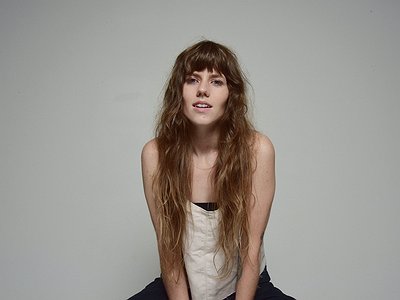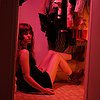Part 2
Collaborations can take on many forms. What role do they play in your approach and what are your preferred ways of engaging with other creatives through, for example, file sharing, jamming or just talking about ideas?
I produced an album last year from a songwriter I really admire, the band is called youbet. Nick, whose project it is, has a song-a-week he hosts on Bandcamp where a bunch of us contribute work.
I work alone a lot, but collaboration is super important, usually in the form of sharing ideas as I work on them. I have a group of friends who play on my records, or help record parts of them, to whom I send demos and ideas as I go, and their feedback shapes a lot of what I do. In the meantime we do talk a lot, share other people’s music, get excited about ideas. The other day I was recording at home and my collaborator Julian sent me an interview with the band Broadcast where Trish said she did vocal takes with a cardboard box over her head. I was doing vocals a few minutes later, so I too put a cardboard box on my head. Wasn’t half bad.
Could you take us through a day in your life, from a possible morning routine through to your work? Do you have a fixed schedule? How do music and other aspects of your life feed back into each other - do you separate them or instead try to make them blend seamlessly?
I am not a greatly routine-oriented person. I work at a record label, so by day I think about the promotional side of it. I don’t have a normal day, but a month will have a week blocked off to record, or travel to play a show, weeks at my day job at the label, entire weekends where I just disappear into my room to record. Everything is cyclical, and I love having periods of time that shift rather than a static day to day. There are months of writing, months of recording, months of planning, then promoting an album, followed by months of performing live.
In a normal time, I’d be getting set to spend time on the road. Since nothing about right now is normal, I’m skipping a whole phase of the cycle and trying to focus on writing and recording again.
Could you describe your creative process on the basis of a piece or album that's particularly dear to you, please? Where did the ideas come from, how were they transformed in your mind, what did you start with and how do you refine these beginnings into the finished work of art?
I could go through the methodology of an album, but I don’t know that it’s a great story. The process always begins with a specific intention, but shifts as soon as I try to achieve it.
There are many descriptions of the ideal state of mind for being creative. What is it like for you? What supports this ideal state of mind and what are distractions? Are there strategies to enter into this state more easily?
Unfortunately it’s still a mystery to me. When I feel the most open, the least self-critical, that’s the best. Usually it starts with having a feeling, or knowing what I want to achieve. It’s like finding a sonic answer. I sit down, and I try to make the sonic counterpoint, with chords and melody, to my mental state. If I find the right combination it quiets my mind, and it’s an excellent feeling.
How is playing live and writing music in the studio connected? What do you achieve and draw from each experience personally? How do you see the relationship between improvisation and composition in this regard?
Playing live is so different. It’s a physical release and it doesn’t, once you’ve already arranged the music for a band, require a lot of heavy brainpower. Writing and arranging and producing is hard because I know for certain I will hit a wall, am lost and don’t know how to move forward. I think I have to work to keep them connected, because as we perform night to night, we get possibly farther from the album itself and into a new territory.
A year or so of performing greatly informed the music I wanted to write for this new album, though, because there were moments in the set I wished I had something different to play, so I went home and made songs to fill those gaps.
How do you see the relationship between the 'sound' aspects of music and the 'composition' aspects? How do you work with sound and timbre to meet certain production ideas and in which way can certain sounds already take on compositional qualities?
I have really sensitive emotional and physiological responses to sound. It goes back to the question of writing, and how I try to write melody and harmony that make my brain happy. Timbre and sound choices are equally important and intuitive. I usually favor dark and warm tones and I don’t seem to notice hiss and fuzz and pile it on a bit. It’s a combo of intention and tendencies.
Our sense of hearing shares intriguing connections to other senses. From your experience, what are some of the most inspiring overlaps between different senses - and what do they tell us about the way our senses work? What happens to sound at its outermost borders?
I guess my greatest connection to hearing is sight, which seems to be the most typical. I don’t claim to be synaesthetic, but everything I do is visual in structure and color. I favor working in dark rooms and with colored light - limiting the sense information aids me to focus or hone in on listening.
I am not qualified to answer what happens to sound at its outermost borders. At its most practical, sound waves simply interact with and affect our bodies and I love how subjectively we all respond.
Art can be a purpose in its own right, but it can also directly feed back into everyday life, take on a social and political role and lead to more engagement. Can you describe your approach to art and being an artist?
I’ve been meaning to read Otto Rank’s Art and Artist for a while now. For me, trying to imagine the social or political while making something is as impossible as trying to picture my “audience.” I try to keep it as simple as expression, and I don’t have a definition for the term artist really.
It is remarkable, in a way, that we have arrived in the 21st century with the basic concept of music still intact. Do you have a vision of music, an idea of what music could be beyond its current form?
I don’t have a vision of it, because things shift slowly. Take pop music for example though, the frequency range is so much wider than it was decades ago and that’s where a lot of it appeals, in the bright high end and in the sub frequencies; a bigger actual sonic picture.
Change is gradual and tied to technology, and impossible to imagine, especially for a fringe musician who’s using decades-old implements to make their music, haha.






